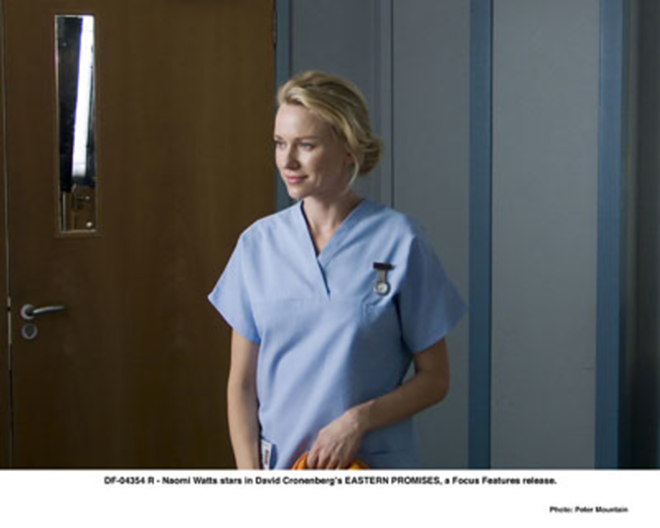
The wait seems longer every year, but it looks like summer is finally over.
In the multiplexes, the signs are unmistakable: Addled, ersatz blockbusters like Transformers and Rush Hour 3 are distant memories, at least for the moment, and Hollywood's big guns seem to ride into town in a more reflective frame of mind (3:10 to Yuma) or at least a more irreverently informed one (Shoot 'em Up). Of course, summer never really ends, at least as far as Hollywood is concerned, and for every The Brave One, there's a Death Sentence lurking right around the corner — but the immediate future is looking rosy, and fall definitely seems to be in the air.
For additional proof, look no further than a trio of films opening this very week from respected filmmakers, each of whom, in his way, resists formula: Crash director Paul Haggis' antiwar screed, In the Valley of Elah; Patrice Leconte's comedy for grown-ups, My Best Friend; and Eastern Promises, the latest from that old button-pusher David Cronenberg, a director who knows how to subvert mainstream cinema better than probably anyone alive.
Eastern Promises isn't quite as elaborately constructed a brainteaser as Cronenberg's recent A History of Violence, but it's definitely cut from the same cloth. The film is set in the multi-culti mean streets of London, and its violence announces itself early, with two profoundly ugly deaths occurring straight off. The movie then proceeds to challenge us to connect its dots, as midwife Naomi Watts, nosing around in a dead girl's diary full of unspeakable secrets, becomes drawn into the murky underworld of the Russian mafia. Chief among these dangerous players are three of the most unforgettable characters you'll see on a screen this year — a Russian restaurateur/Godfather (Armin Mueller-Stahl), his psychotic son (Vincent Cassel, as memorably sadistic as any classic noir henchmen) and, most crucially, their enigmatic chauffeur/bagman (Viggo Mortensen), whose moral ambivalence twists the story into strange new shapes.
Cronenberg lets the tale unfold in a psychologically charged but meticulously minimalist and often oblique manner, with key events sometimes occurring off-screen and violence mostly implied — although when it does occasionally rise to the surface in all its ugly-as-sin glory, be prepared. The literary infusions favored by the filmmaker continue here, with Eastern Promises driven by periodic excerpts from the dead girl's diary, a dark fairy tale of innocence lost that, evoking The Little Match Girl, feels entirely appropriate for the film's Christmas-season setting.
There's a last-act twist that slightly cheapens the movie (although some will certainly appreciate the closure), but the rest is sheer pleasure, a taut genre-buster filled with elegantly creepy Cronenberg-ian touches, one of the most brutal fight sequences ever and numerous reminders that the Russian mafia enjoy their cooking just as much as their Italian counterparts do.
A mystery of a much more obvious stripe, Paul Haggis' In the Valley of Elah is every bit as ambitious as the director's Oscar-winning Crash, but it's also prone to the same sort of preachiness, as well as a few other problems. Tommy Lee Jones, craggier than ever and quietly astonishing, stars as an ex-military man and staunch patriot investigating the disappearance of his son, gone AWOL after serving 18 months in Iraq. Jones' performance is tough, understated genius, but the movie's pieces fall into place around him in a contrived and even histrionic fashion that's in direct contradiction to the brooding center of gravity created by Jones.
After the enormous success of Crash, nobody's going to tell Paul Haggis how to make a movie, but In the Valley of Elah is simply too self-serious, too long, and less than halfway through, we know pretty much where it's going. Haggis' script labors to work noble messages about racism and sexism into its kitchen-sink mosaic (Charlize Theron plays Jones' partner, a female detective routinely discriminated against by male colleagues), but the movie's real raison d'etre is to rail against Bush's war and eventually transform Jones' old-school right-winger into Cindy Sheehan.
Eventually, it becomes hard to take Elah seriously as a police procedural. Long before the mystery is officially solved, it's clear that it's basically just a vehicle for making points about the corruption of values that results from all wars (but particularly this one), and virtually the entire last half hour hammers home this warning. Haggis simply doesn't know when to let up and even ends it all in the same groan-inducingly lofty place it began, with an American flag hung upside down — a signal for a country in distress. Apparently, he deemed the metaphor so nice, he just had to show it twice.
On the lighter side of things this week, there's My Best Friend, the new comedy from French filmmaker Patrice Leconte. The movie riffs sweetly on the frisson generated from walking a mile in someone else's shoes — a theme that bloomed in Leconte's 2003's Man on the Train — presenting us with a modern-day Scrooge who hooks up with an affable everyman and, against all odds, learns how to be human.
French icon Daniel Auteuil plays Francois, an antiques dealer too busy making money to realize he has no real connection with the rest of humanity. It's not that Francois's a bad person or even an obnoxious one (as he surely will be in the inevitable Hollywood remake) — he's just a bit cold, self-centered and with no real appreciation of social niceties. So when he's challenged to produce that titular best friend, Francois sets out surveying the social landscape of Paris like some alien observer recently dropped in from Mars (his droll cluelessness in stark contrast to the broad bumbling Hollywood generally prefers) — and eventually pays a chatty cabbie named Bruno (Dany Boon) to teach him how to be "sociable."
Francois and Bruno become fast friends — as if you couldn't guess — and Leconte creates a pleasant enough diversion observing the odd couple bonding over soccer games and Sunday dinner with the folks. The performances here are low-key and likeable (so likeable, in fact, that it's sometimes a struggle accepting Francois as the arrogant prick he's supposed to be) in what amounts to a refreshing change of pace from the elegant intensity of signature films like The Hairdresser's Husband and Monsieur Hire. Leconte continues to be a director who does things his own way, and My Best Friend shows us here that even light comedy can offer its own rewards.















